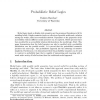Free Online Productivity Tools
i2Speak
i2Symbol
i2OCR
iTex2Img
iWeb2Print
iWeb2Shot
i2Type
iPdf2Split
iPdf2Merge
i2Bopomofo
i2Arabic
i2Style
i2Image
i2PDF
iLatex2Rtf
Sci2ools
112
click to vote
ECAI
1990
Springer
1990
Springer
Probabilistic Belief Logics
Modal logics based on Kripke style semantics are the prominent formalismin AI for modeling beliefs. Kripke semantics involve a collection of possible worlds and a relation among the worlds, called an accessibility relation. Dependent on the properties of the accessibility relation di erent modal operators can be captured. Belief operators have been modeled by an accessibility relation which produces the modal logic KD45. This paper demonstrates how the belief operator can also be modeled with a probability distribution over the possible worlds. It is proved that the probabilistic semantics produces the same logic. The probabilistic approach has the advantage of intuitive simplicity. Furthermore, it is demonstrated how the probability semantics can be used to construct a probability logic that is capable of representing and reasoning with a much wider variety of belief notions than the traditional modal approach.
Related Content
| Added | 11 Aug 2010 |
| Updated | 11 Aug 2010 |
| Type | Conference |
| Year | 1990 |
| Where | ECAI |
| Authors | Fahiem Bacchus |
Comments (0)

